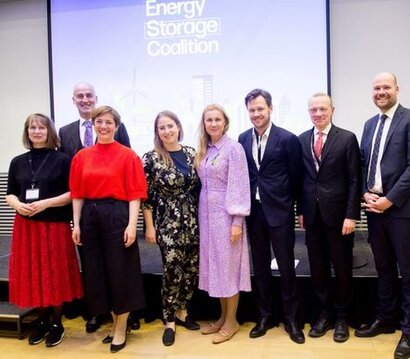
The event was attended by over 150 policymakers, industry and associations representatives. It provided an opportunity to discuss how the upcoming EU Electricity Market Design can address current barriers to the deployment and use of energy storage technologies in Europe.
The keynote speaker, Kadri Simson, European Commissioner for Energy, presented the work of the European Commission to foster renewable energy sources and energy storage deployment, particularly in the context of the upcoming EU Electricity Market Design revision. The Commissioner emphasised that energy storage is key to building a future-proof, resilient and decarbonised energy system and the Energy Storage Coalition is a welcome development, and will be an important interlocutor going forward.
The Coalition partners presented how energy storage can provide the flexibility needed to ensure the European Union meets its decarbonisation targets, strengthens energy security, and achieves lower energy prices.
Philipp Offenberg, Senior Manager Europe of Breakthrough Energy, reiterated the critical need to have the right policy and investment frameworks in place to drive deployment and scale of long duration energy storage technologies.
Walburga Hemetsberger, CEO of SolarPower Europe, pointed out that as “last winter, EU renewables generated more electricity than fossil fuels, it’s clear that solar and renewables can power Europe in all seasons. We need strong energy infrastructure to make year-round renewables the norm. That means taking energy storage seriously and getting the grid ready.”
Giles Dickson, CEO of WindEurope, highlighted that “more storage is needed to help ramp up the capacity of wind farms that can connect to the grids, especially at their weakest points. We also need to make sure that each KWh produced by wind farms can be used to its full potential and in the best way possible. To secure Europe’s energy supply we need to offer system flexibility while reducing to zero our dependence on fossil fuels.”
Patrick Clerens, Secretary General of EASE - The European Association for Storage of Energy, emphasised that energy storage contributes in alleviating grid constraints and grid extension costs. “It is paramount to accelerate the process of electrification - and here is where energy storage can help lowering costs and contribute to further renewables’ deployment”.
The event facilitated a fruitful discussion on how upcoming legislation will accelerate a surge in renewables and energy storage, and demonstrated the need to reform the electricity market design to ensure energy security, that must be achieved through non-fossil solutions.
"Energy storage is often the forgotten treasure” said MEP Emma Wiesner. “In the current electricity market reform we have a great opportunity to unlock the potential of energy storage in Europe's energy system!”
MEP Niels Fuglsang added, “The answer to the energy crisis is more energy efficiency and renewable energy. At the heart of such an energy system is energy storage. It is the key enabler for a resilient and highly electrified system. Now more than ever, it is clear that Europe needs to prioritise storage as part of its aim to become more resilient. More energy storage simply means more energy independence and more clean energy. I therefore welcome very much the Energy Storage Coalition as a timely initiative.”
Catharina Sikow-Magny, Director Green Transition and Energy System Integration, Directorate General for Energy at the European Commission concluded the event by stating that the European Commission has put in place several legislative changes that can dramatically improve the regulatory framework for energy storage and it is paramount to ensure the swift implementations of such provisions at the Member State level so that energy storage is able to fulfil its key role in the energy system.
The event showcased the growing importance of energy storage in Europe’s energy transition, and the role it can play in achieving a sustainable, low-carbon future. All speakers agreed that it is paramount to increase the resilience of Europe’s energy system and ensure affordable electricity to protect consumers.
For additional information:

